
Walker Accessories
Product Guide and Recommendations
Walker accessories make walkers safer, easier to use and more convenient.
Some walkers come with standard bags and baskets but they may not be exactly what the senior wants. Maybe they want one that has a top, or is bigger or looks nicer than black!
Maybe they use oxygen and need a way to carry the oxygen tank.
It can fit in some walker bags but it's much easier (and more secure) if it's attached in a proper oxygen tank holder.
Some elderly go for longer walks and prefer to carry a water bottle or other drink. They risk spilling it if they try to stand it up in the standard bag/basket. A cup holder is easy to add and makes it more convenient.
But there are more than just different bags, cup and oxygen tank holders. Read more about walker accessories below.
Overview
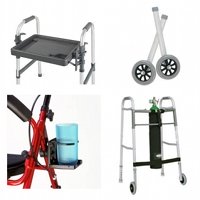
Walker accessories can make using a walker easier and more convenient.
Bags and baskets help carry items as the seniors hands will be busy holding onto the handles.
Oxygen holders safely and securely hold oxygen tanks for seniors who use oxygen.
Cane and cup holders make it easy to carry both as they can sometimes be difficult to put in a bag or basket.
Trays
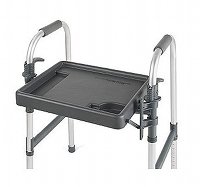
Purpose: Carry items
Walker trays are great for carrying small items with a folding walker such as a plate of food.
Whereas a bag or basket may be useful with a rollator walker around town, a tray is better for moving plates, cups etc. around the senior's home.
Trays are more difficult to use on folding walkers (which need to be picked up every two steps) than wheeled walkers that roll smoothly on the ground.
They can be removed so the walker can fold up to put in the trunk of a car.
Baskets
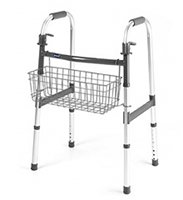
Purpose: Carry items
Walker baskets are great for carrying items such as a few groceries.
They can be removed so the walker can fold up to put in the trunk of a car.
They come in a variety of sizes, colors and styles depending on the model of walker.
The photo shows a basket on a folding walker but they are available for all types of walkers for elderly.
Some rollator walkers have "baskets" that are actually cloth bags under the seat that fold up with the walker.
Bags
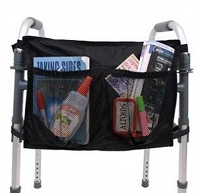
Purpose: Carry items
Walker bags are convenient walker accessories as they can carry items and keep them out of prying eyes - good for keeping a purse or phone - so someone cannot reach in and grab it.
Although I would not leave a walker with valuable items unattended in it's bag or basket, the bag doesn't easily allow others to know what you are carrying.
If you plan to carry heavier items, use a walker bag that attaches lower to the ground. Weight added higher up on the walker can make it easier to tip over.
Oxygen Holder
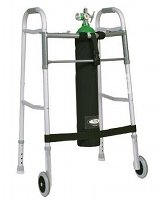
Purpose: Carry oxygen tank
Walker oxygen holders are great walker accessories for elderly who use oxygen.
Oxygen tanks do not easily fit in walker baskets and bags.
Similar to walker bags, try to keep the weight low to the ground so it doesn't make the walker easier to tip over.
Cane Holder
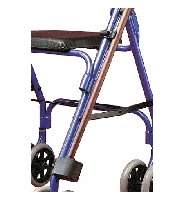
Purpose: Carry cane
Cane holders are simple walker accessories that solve a common problem.
Some elderly find it helpful to bring a cane with them as they may need to use it to get into a space that a walker cannot go.
For example, some bathrooms are too small for rollator walkers to easily manoeuvre around.
Canes are also hard to fit into walker bags and baskets due to their length.
Cup Holder
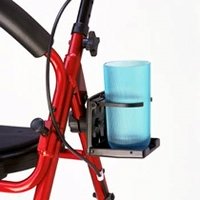
Purpose: Carry water bottle or other drink container
Standard walker bags and baskets do not easily carry drink containers. Plus you risk the chance of spilling it over everything in the bag/basket.
A walker cup holder is easy to add and makes it much more convenient to carry a drink.
Forearm Attachments
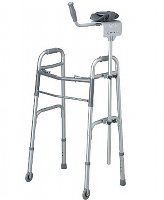
Purpose: Alternative to holding onto standard handles (mainly for elderly with a broken hand/wrist or who have arthritis)
Forearm attachments allow elderly who have had wrist/hand fractures and/or surgery to use a walker since they cannot hold onto a walker regularly. It is also used when the doctor does not want the senior to place weight through their hand/wrist.
The senior can rest their forearm(s) in the gutter part of the attachment, strap their arm in place and use the walker as normal.
The photo shows a forearm attachment on a folding walker but they can be attached to a variety of walkers. Some rollator walkers have their own forearm attachments that replace the standard handles.
Folding Walker Wheels and Skids/skis

Purpose: Allow a standard walker to be pushed instead of having to pick it up every two steps
A folding walker can be converted into a front wheel (or two wheel) walker by replacing the standard legs with wheels.
This should only be done if the senior does not need to keep weight off their leg/foot as it is not as stable as a standard folding walker.
I recommend fixed wheels and not the castor style (which swivel) as they can be unstable.
In addition to the wheels, I also suggest adding skids/skis to the rear legs so they glide easier on the ground.
Return to Mobility Products for the Elderly
Return to Caring for Aging Parents


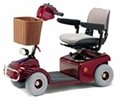



New! Comments
Have your say about what you just read! Leave me a comment in the box below.